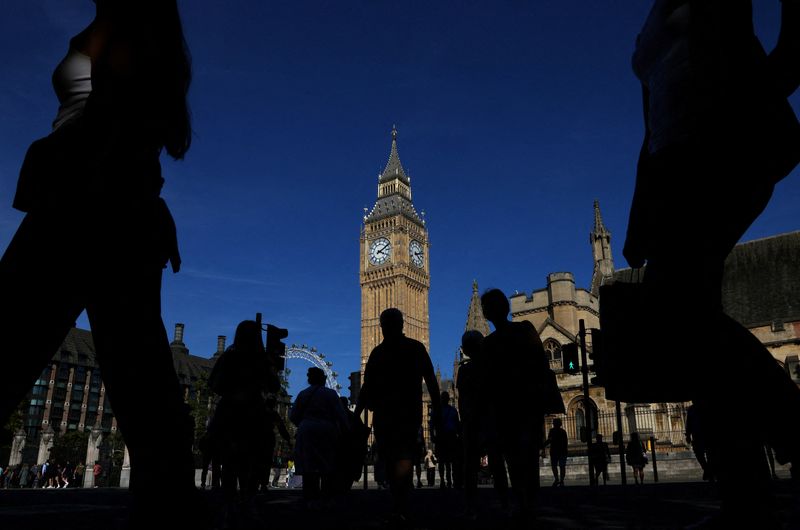Gold prices set for weekly gains on dovish Fed outlook; silver near record high
By William Schomberg and David Milliken
LONDON (Reuters) -Wages in Britain grew slightly less fast in the three months to September after rising at a record pace previously, according to official data that will leave the Bank of England on alert for inflation pressures.
Earnings excluding bonuses were 7.7% higher than a year earlier in the third quarter, the figures from the Office for National Statistics (ONS) showed on Tuesday, in line with economists' expectations in a Reuters poll.
The figure represented a slight slowdown in regular pay growth from 7.9% in the previous two ONS reports, the highest since this data series began in 2001.
Britain's economy is flat-lining as the BoE's long run of interest rate hikes squeezes households and businesses. But employers are still struggling to fill vacancies after many workers left the job market during the coronavirus pandemic, with Brexit also reducing the supply of candidates.
"The labour market remains very tight and businesses are still struggling to hire the people they need," Alexandra Hall-Chen, a policy adviser at the Institute of Directors, said.
The BoE is watching pay growth as it assesses how much inflation pressure remains in Britain's economy after raising interest rates 14 times in a row between December 2021 and August this year. Since then, it has kept rates on hold.
Including bonuses, which are typically volatile, pay growth slowed to 7.9% from 8.2% in the three months to August.
The BoE has said pay growth is dropping too slowly for it to consider cutting interest rates, although it has also said unofficial estimates of wage increases suggest a less steep climb than the ONS numbers.
Sterling rose slightly against the U.S. dollar after the ONS released its figures.
James Smith, an economist with ING, said pay pressures were heading in the right direction for the BoE with private-sector regular wage growth falling to 7.8% from 8.1% in the June-August period, echoing other signs of a gradual easing.
"All of that suggests the BoE's forecast for private-sector wage growth to hit 6.6% in March appears to be on track, and if anything, might be beaten on the downside," he said, adding that further progress could lead to a first BoE rate cut next August.
Tuesday's data showed a fall in vacancies to 957,000, their lowest level since the second quarter of 2021 though still about 15% higher than before the COVID-19 pandemic.
UNEMPLOYMENT STEADY
Britain's unemployment rate held at 4.2%, according to experimental figures the ONS is using to offset a drop in response rates to its usual Labour Force Survey of households that seeks to measure changes in employment and unemployment.
Employment rose by 54,000 in the three months to September. The economists polled by Reuters had expected a sharp fall.
Finance minister Jeremy Hunt welcomed an increase in wages when adjusted for inflation. Consumer price inflation has fallen from a 41-year high of more than 11% just over a year ago and is expected to dip under 5% in data due on Wednesday.
Hunt said his Nov. 22 update on the budget and economy would include "plans to get people back into work and deliver growth for the UK".
Tony Wilson, director at the Institute for Employment Studies, said the latest data suggest that falls were happening in jobs in industries more sensitive to an economic slowdown, such as hospitality and construction.
But there were also too many people out of work and not looking for it which was helping to push up wage growth, meaning Hunt should widen access to support and retraining programmes.
"There is a clear need to do more to try to boost employment and support growth," Wilson said.
(Addition reporting by Sachin Ravikumar, Editing by Ed Osmond and Mark Heinrich)
